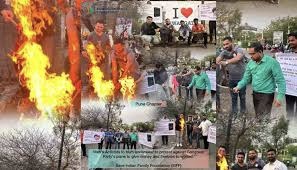Pune Men Protest Against Gender-Specific Policies By Burning Underwear

Pune Men Protest Against Gender-Specific Policies By Burning Underwear
A group of men in Pune staged a unique protest against the Congress party’s recent manifesto which promises special benefits for women. They burned their underwear in a striking display of dissent. The Save India Family Foundation (SIFF) organized the protest and called on men across the city to join them in expressing their disapproval through this unconventional method.
The core of the protesters’ grievance lies in what they perceive as a misuse of Article 15 of the Indian Constitution. This article, while prohibiting discrimination based on caste, religion, or sex, also contains a sub-section that permits the government to make special provisions for women. Protesters argue this results in unfair treatment towards men, as there are no equivalent provisions for them.
Rajesh Vakharia, the Pune City President of SIFF, criticized Congress leader Rahul Gandhi’s strategy to woo female voters by promising them financial benefits, including a monthly transfer of ₹8,500 to poor women and promises of free bus travel. “Rahul Gandhi is not only trying to attract women voters but is also fostering societal division and threatening the fundamental principles of democracy,” said Vakharia.
Adding to the controversy, SIFF counsellor Sagar Gunthal highlighted the broader implications of such gender-specific policies. “Our protest isn’t just against the Congress but also challenges the constitutionality of Article 15. It absurdly makes male rape legal in India, ignoring male victims of rape and domestic violence due to legal oversights that don’t recognize men as possible victims,” Gunther explained.
SIFF’s protest saw partially burnt pieces of men’s underwear being collected to be sent to the Congress party as a mark of their protest. The group is also calling for the BJP to propose an amendment to Article 15 to prevent what they claim is discrimination against men.
The protest underscores a growing discontent among certain groups over policies they deem discriminatory. It also raises questions about gender equity and the interpretation of constitutional rights in policymaking.








